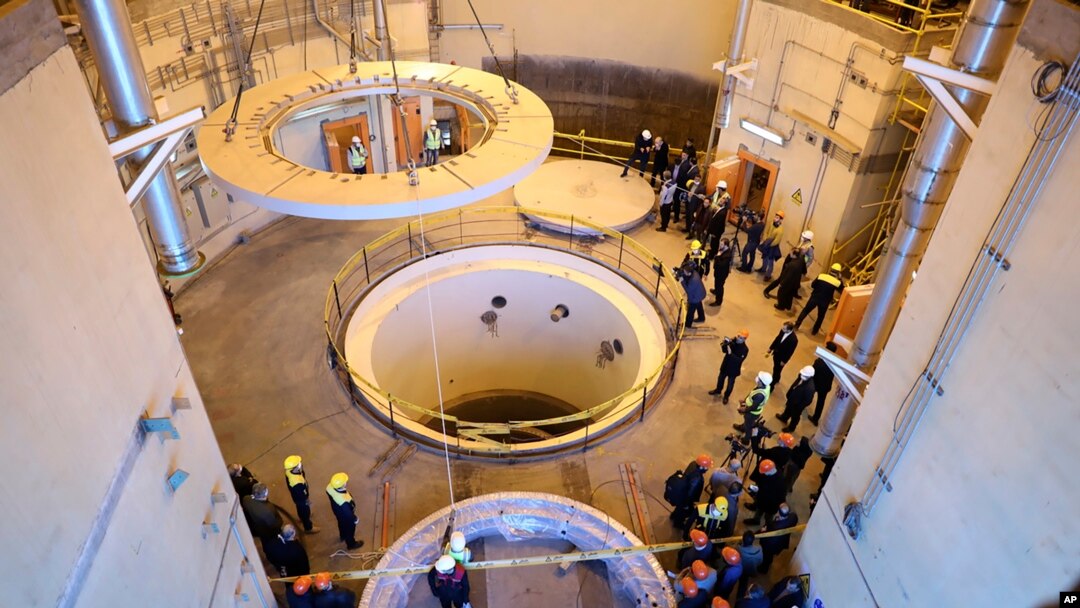The United Nations nuclear watchdog, International Atomic Energy Agency (IAEA) has condemned Iran’s move to withdraw accreditation for several of its most experienced inspectors as “disproportionate and unprecedented”.
U.N. nuclear chief Rafael Grossi said in an interview Monday, Sep. 18, 2023 with the media that the Iranian government’s removal of many cameras and electronic monitoring systems installed by the International Atomic Energy Agency make it impossible to give assurances about the country’s nuclear program. Grossi has previously warned that Tehran has enough enriched uranium for “several” nuclear bombs if it chose to build them.

Grossi said the experts who lost accreditation had “unique knowledge in enrichment technology” and had previously conducted essential verification work at Iranian enrichment facilities under IAEA safeguards. Grossi said Iran’s move “constitutes an unnecessary blow to an already strained relationship between the IAEA and Iran”.
The IAEA director general also said he asked to meet Iran’s President Ebrahim Raisi to try to reverse Tehran’s uncalled for ban on “a very sizable chunk” of the agency’s inspectors.
The deal
In 2015, major world powers reached a deal with Iran under which it was to check its nuclear programme in exchange for relief from crippling economic sanctions. But in 2018, then-US President Donald Trump unilaterally withdrew from the deal and reimposed sanctions.
Iran’s response
The strongly worded statement came amid longstanding tensions between Iran and the IAEA, which is tasked with monitoring Iran’s nuclear programme that western nations suspected is aimed at developing nuclear weapons. Iran insists the programme is peaceful.
Iran’s foreign ministry criticised the IAEA’s approach, linking it to an alleged attempt by the US, France, Germany and Britain to misuse the UN’s nuclear agency “for their own political purposes” and in retaliation for “political abuses”.
The Vienna-based IAEA reported earlier this month that Iran had slowed the pace at which it was enriching uranium to nearly weapons-grade levels. That was seen as a sign that Iran was trying to ease tensions after years of strain in its relationship with the US.
A top Pentagon official had reported that Iran could make the nuclear material for a device in about 12 days if it wanted to do so. The International Atomic Energy Agency also stated its monitors had detected that Iran now had the capability of enriching uranium to close to 84%, which is on the verge of making weapons-grade uranium.
Colin Kahl, the Pentagon’s top policy official, when asked to describe Iran’s nuclear progress since then-President Donald Trump pulled the U.S. out of the Iran nuclear deal, known as the Joint Comprehensive Plan of Action, or JCPOA.
“Iran’s nuclear progress since we left the JCPOA has been remarkable,” Kahl said. “Back in 2018, when the previous administration decided to leave the JCPOA, it would have taken Iran about 12 months to produce one bomb’s worth of fissile material,” said Kahl about Iran’s so called “breakout time. “Now it would take about 12 days.”
Kahl said he still thinks going back to the deal is better than not having any deal because he said it could “put constraints” on Iran. At the same, he acknowledged that isn’t likely, given that efforts to go back to the deal are “on ice” since Iran turned down a U.S. offer last summer.
“Of course, Iran’s behavior has changed since then, not the least of which there’s support for Russia and Ukraine, which is the subject of the conversation here today,” he told lawmakers. “So, I don’t think we’re on the precipice of reentering the JCPOA.”
Meanwhile, Iran’s President Ebrahim Raisi said Tuesday that his country will never give up its right “to have peaceful nuclear energy” and urged the United States “to demonstrate in a verifiable fashion” that it wants to return to the 2015 nuclear deal. Addressing the annual high-level meeting of the U.N. General Assembly on Wednesday, September 20, 2023, Raisi said the American withdrawal from the deal trampled on U.S. commitments and was “an inappropriate response” to Iran’s fulfillment of its commitments.
Raisi made no mention of the IAEA inspectors but the European Union issued a statement late Tuesday saying its top diplomat, Josep Borrell, met Iran’s Foreign Minister on Tuesday and raised the nuclear deal and the inspectors as well as Iran’s arbitrary detention of many EU citizens including dual nationals.
